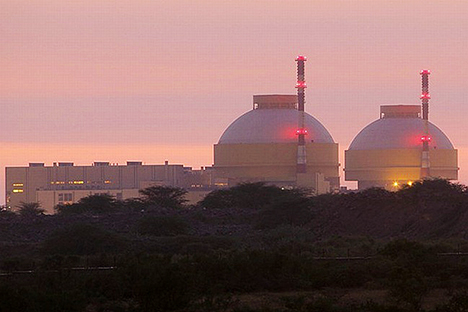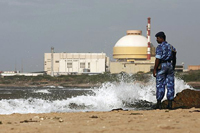Kudankulam launch during Putin’s visit?

The paper’s sources said the Russian President would not go to Tamil Nadu for the commissioning. Source: Press Photo
The first reactor of the Russian-operated Kudankulam Nuclear Power Project (KNPP) could be commissioned when Vladimir Putin visits India in late-December, the Times of India said on Sunday. Diplomatic sources told the paper that the possibility of commissioning the reactor while Putin is in India cannot be excluded as this will have an immense "symbolic value'' for relations.
The paper’s sources said the Russian President would not go to Tamil Nadu for the commissioning. “The time constraint will prevent Putin from going there himself but the commissioning can happen even in a virtual manner with the Russian President and PM Manmohan Singh together giving the go-ahead from Delhi,” the Times of India quoted a source.
Any amount of publicity or hype may lead to a fresh wave of protests from US-backed NGOs in the area that have been instigating fishermen and farmers to block work on the project.
The Nuclear Power Corporation of India Limited (NPCIL) started loading uranium fuel in the reactor in September and now trials at different operating conditions are being carried out. “We have reached a stage where the commissioning of the plant means no more than pushing a button,” a source told the Times.
The newspaper added that the launch of the plant during Putin’s visit could be a “significant takeaway” from his summit meetings with Indian Prime Minister Manmohan Singh since there was little likelihood of any settlement of issues concerning Sistema and Kudankulam 3 and 4.
The KNPP involves 1,000 MW reactors of the VVER-1000 model being constructed by NPCIL and Russia’s Atomstroyexport company, a Rosatom subsidiary.
India signed a contract with the Soviet Union to build the Kudankulam plant in 1988, while the actual construction started only in 1997 due to due to the political and economic upheaval in Russia after the collapse of the Soviet Union in 1991.
The construction of the first two units of the power plant was halted in September 2011 over protests by local residents who demanded the scrapping of the Indo-Russian project citing the Fukushima nuclear disaster in Japan. Protesters had blocked all roads to the plant and would not allow the workers to enter. The work resumed in March 2012.
Former Indian President APJ Abdul Kalam has strongly backed the project. Kalam and another expert V. Ponrajhad have visited the KNPP site and reviewed the safety standards. They went on record to say that the KNPP is situated 1500 kilometres away from the epicentre, the plant site was thus safe and there was “absolutely no possibility for any danger.”
All rights reserved by Rossiyskaya Gazeta.
Subscribe
to our newsletter!
Get the week's best stories straight to your inbox
